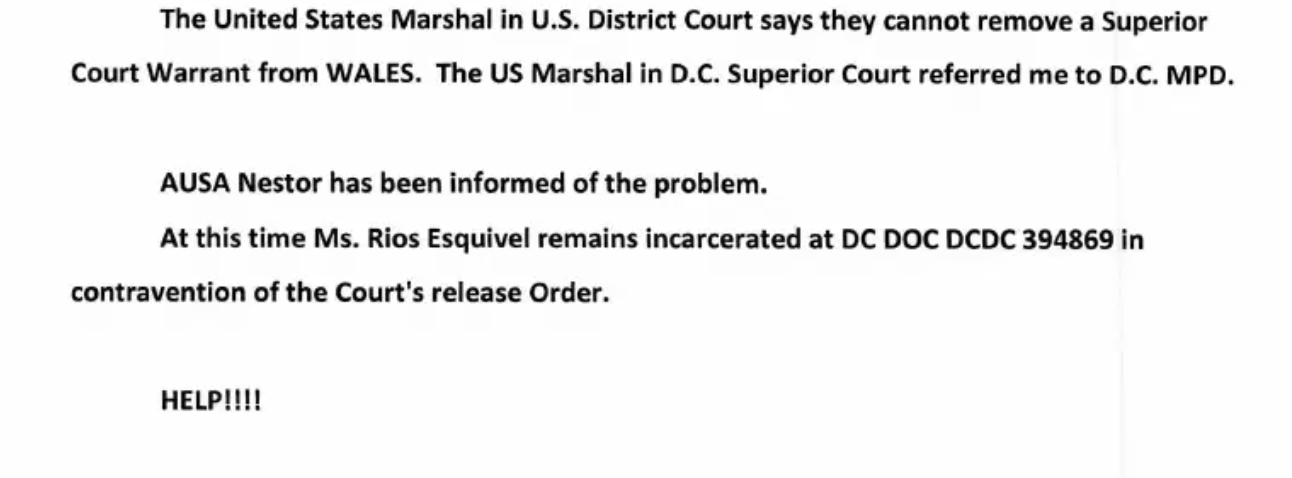Kristal Rios Esquivel, a woman who faced a string of unfortunate events leading to a wrongful week-long detainment, has brought to light a significant lapse in the justice system. On August 20, Esquivel was arrested for an altercation at the National Zoo when she attempted to access a restricted staff entrance leading to a birdhouse. According to the authorities, during her arrest, she allegedly spat on a police sergeant and made physical contact with another officer’s leg, as outlined in court documents found on the D.C. federal court’s database.
The transparency in these initial charges quickly clouded over due to a series of mishaps and procedural errors by federal and D.C. authorities post-arrest. Despite the Justice Department’s decision not to seek pretrial detention as per the documents, Esquivel was not presented in front of a federal magistrate judge promptly. It took until August 25, a full five days past the expected date, for her to be brought to court.
U.S. District Judge Zia Faruqui highlighted the oversight in his order, stating that on the day Esquivel appeared in court, the government argued for her release under minimal conditions. Nonetheless, Esquivel remained detained—he noted this in his remarks and questioned the necessity of her initial detention.
The complications in Esquivel’s case intensified when her defense lawyer filed a motion to alert the court that despite these rulings, she hadn’t been released. A subsequent court document dramatically captured the sense of urgency and desperation with a single-word outcry: “HELP!!!!” This message painted a grim picture of the turmoil and confusion wrapping Esquivel’s defense team’s efforts to secure her rightful freedom.
Judge Faruqui, upon examining the circumstances, revealed a critical error involving the DOC and the corrections system’s database, which mistakenly listed Esquivel under an active warrant despite that warrant being for the current arrest—a fact confirmed during her August 25 court appearance. This incorrect “hit” in the database left her unjustly incarcerated, a situation the judge deemed a “false imprisonment.” His ruling further discussed the broader systemic challenges that contributed to this severe oversight, emphasizing the inexplicable difficulty in executing straightforward judicial orders for release.
A spokesperson for the Justice Department eventually facilitated the correction of this error, though this action came only after significant external pressures, including those from media inquiries seeking accountability.
As developments unfolded, a statement from the Department of Corrections (DOC) clarified that the standard procedure during the inmate release process involves checks against national criminal databases to identify outstanding warrants or detainers. In Esquivel’s case, this process erroneously identified an FBI warrant, which further delayed her release until the issue was resolved. The DOC stressed its commitment to processing releases as expeditiously as possible while ensuring full compliance with legal requirements, albeit acknowledging the challenges posed by limitations beyond its control regarding warrant accuracy and issuance.
This incident featuring Esquivel ran parallel to other contentious judicial proceedings in Washington, D.C., underlining ongoing issues with the federal handling of justice within the district. Notably, another case that drew attention was that of Sydney Reid, who, following an altercation involving a federal officer, saw a shift in her charges from felony to misdemeanor due to prosecutors’ failure to secure a grand jury indictment.
Another similar instance involved a former Justice Department employee accused of throwing a sandwich at a federal officer, where again, federal prosecutors failed to secure a necessary felony indictment.
These examples coalesce around a growing concern regarding the efficacy, transparency, and fairness of the legal processes currently governing the capital – tensions magnified by the ongoing federal oversight and critiqued by observers and insiders alike who cite a prevailing sense of foreboding and systemic failure.
This sequence of events, errors, and judicial interventions in Esquivel’s case punctuates a pressing need for dialogue and reform within the justice system, particularly about how detainees are treated and the mechanisms that ensure the execution of court orders. The circumstances surrounding Esquivel’s incorrect detainment raise fundamental questions about competency and human rights within the frameworks of justice administration. These incidents not only disrupt the lives of individuals like Kristal Rios Esquivel but also erode public trust in the instruments of law and order designed to protect and serve the community fairly and justly.









